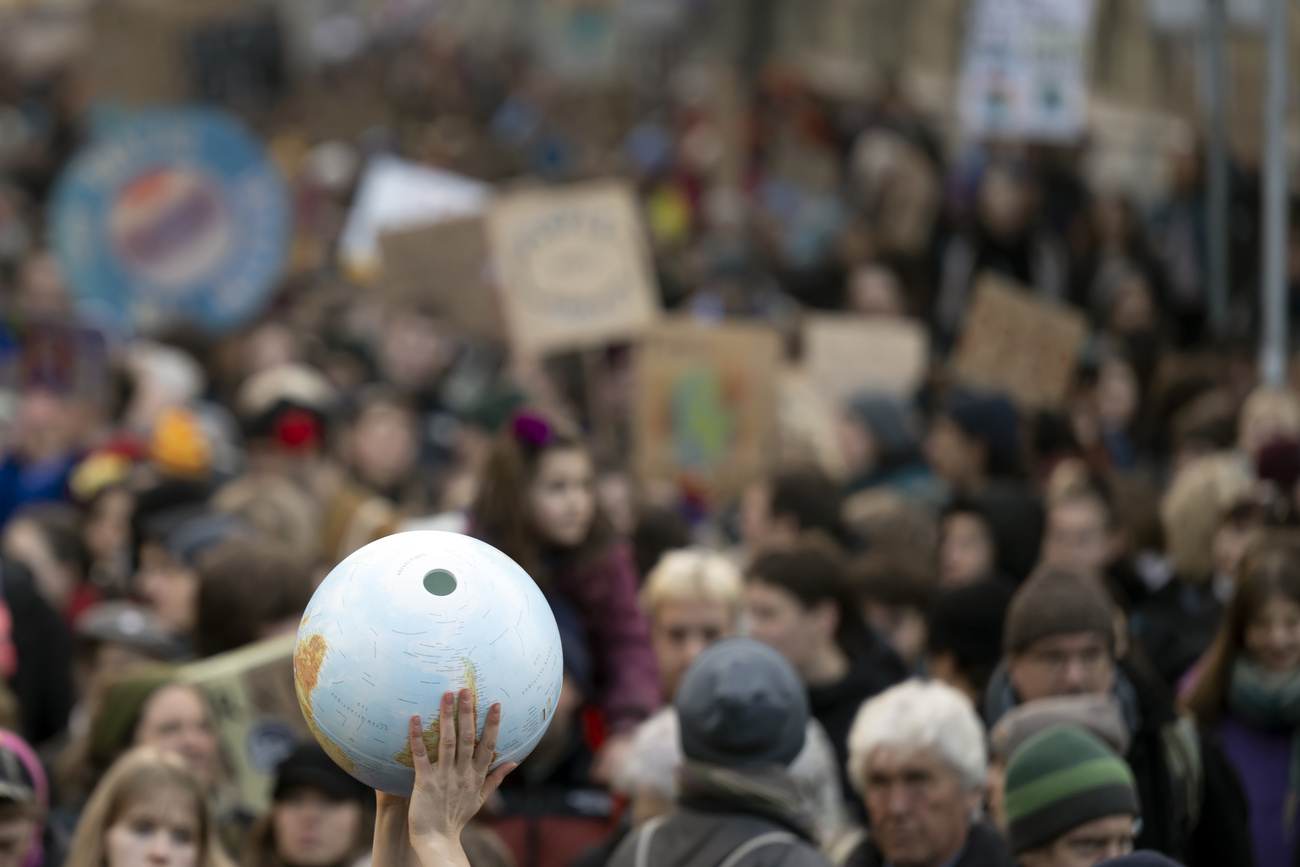Swiss climate activists continue to protest, but change ‘is not easy’

On Friday activists gather in Swiss cities for the latest “global climate strike”. As numbers on the streets dwindle, is the movement still influential?
In September 2019 Swiss climate activism hit the big time when 100,000 people demonstrated in Bern, many of them inspired by Swedish activist Greta Thunberg’s global climate movement.
A month later, parliamentary elections vindicated the mood, with the Green Party making unprecedented gains.
Things have since gone a bit differently: following a pandemic, various wars, a cost-of-living squeeze, and a banking collapse, carbon emissions are still a top concern for the Swiss population – but not always the top. While people are largely aware of climate issues, they aren’t always ready to act accordingly: the Greens slipped back again in 2023 elections, Zurich airport is thriving, SUV sales are booming, and numbers at Swiss climate protests have “melted faster than the glaciers”, as the Tages-Anzeiger wrote last year.
“I didn’t even think it would be necessary to still be campaigning five years later,” says activist Meret Schefer. “In 2019 we thought we could change everything. It was very powerful. Over the years you learn it’s not that easy.”
Schefer, who was a 15-year-old secondary-school student in 2019, is now a spokeswoman for Fridays for Future, a movement known in Switzerland as “Climate Strike”. She is also one of the few remaining members who have been around from the start.
“We’ve lost a few people along the way,” she says. Some have moved on to other roles with environmental aims; others just dropped off. She doesn’t begrudge anyone for doing that, she says. Climate campaigning is hard work, and “not the way we should be spending our youth”.
This Friday the movement will organise its latest “strike” in Bern and other Swiss cities, with four key demands: an end to fossil fuel use, a boosting of renewable infrastructure, a democratisation of the energy sector, and a “socially fair” reduction in energy usage.
However, 100,000 are unlikely to turn up. “If 2,000 come, I’m happy,” Schefer says.

More
Landmark ruling: Switzerland’s climate policy violates human rights
Diversification
Overall she isn’t so worried about numbers. “Our activism isn’t just about the part on the street anymore,” she says. Demonstrations are important as a means of engagement and solidarity, especially for young people – “it made me feel less alone” – but the movement has “diversified” since 2019.
Notably, it has tried to build more solid organisational structures, to allow it to persist beyond the half-decade it’s already been around. It also organises more educational and exchange projects, including with activists from other countries; some members have since run for political office.
Fridays for Future is also active on the legal level, where – like the Senior Women for Climate Protection in Strasbourg last week – it recently scored a coup: in Birr, canton Aargau, it supported a local woman who successfully appealed to the Federal Administrative Court against the government’s plan to operate an emergency gas power station.
This “victory”, which Schefer says she wouldn’t have been able to imagine five years ago, has since emboldened Fridays for Future to take aim at the government’s wider plans for reserve power plants. It will also be a reason to celebrate – and publicise – at the demonstration in Bern on Friday, the group says.
Fine line
Whether it’s also a sign of a wider “new impetus” for the climate movement, as Swiss public television, SRF, wondered this weekExternal link, remains to be seen. Especially since Fridays for Future is not the only player in the climate movement. Since 2019, groups such as Renovate Switzerland or Extinction Rebellion have grabbed much of the media attention by blocking streets or daubing buildings; they have also annoyed much of the population as a result.

Isabelle Stadelmann-Steffen, a professor of political science at the University of Bern, says climate movements, like any small activist groups, can have a big impact in the Swiss direct democracy system – if not directly, then “by impacting public opinion and sparking debate”.
But they also have to walk the fine line between “being seen and triggering an opposite reaction”, she says. Surveys have shown that blocking roads is a turn-off for many. And, unfortunately for Fridays for Future, Stadelmann-Steffen “doesn’t think that most people differentiate between the various climate action groups”.
Lumped together
Climate activist Schefer agrees that the public tends to lump all the movements into one pot, even though they don’t work systematically together. She also says her group even faced accusations of being responsible – via the radical nature of the Renovate Switzerland and Extinction Rebellion tactics – for the political losses incurred by the Green Party last year.
Internationally, Fridays for Future has meanwhile come under some scrutiny due to its positions on issues such as the Israel-Palestine conflict. And figurehead Thunberg, who has always faced criticism, is these days often in the news for getting arrested.
Schefer doesn’t feel like there is anything to apologise for. When it comes to taking stances in less “traditional” fields such as anti-racism or the Palestinian question, she says this stems from a realisation that climate problems permeate all questions of justice; it also comes from being part of a global movement with members from underprivileged parts of the world.
As for the civil disobedience, the Swiss Fridays for Future has never blocked roads, she says. Since many of its members are young teens, such a method would hardly be advisable. But she doesn’t condemn such tactics, nor does she understand the “huge anger” they spark: in the end, climate activists work for the benefit of all, while politics remains inactive, she says.

More
Rebellious (but pragmatic) climate movements
Small steps
Yet at the political level in Switzerland, things have hardly been deadlocked since 2019. After citizens themselves torpedoed a proposed CO2 law in 2021, last year they voted in favour of reaching carbon neutrality by 2050. In June they’ll have the final say on an “electricity law” to speed up the building of large-scale solar and wind parks.
Is it enough? Political scientist Stadelmann-Steffen says policymaking always takes place in the gap between the ideal and the feasible. This is even more so the case in the Swiss system of “compromise and small steps”. And climate policy is no exception, she says – or if it is, it is exceptional in that politicians have actually taken bigger steps than usual, at least in the past few months.
Schefer disagrees. Measures such as the proposed electricity law – which Fridays for Future has officially backed – show that “people are clearly thinking about the climate”, she says. But all the incremental advances never allow her to believe that enough is being done overall. “I’m too impatient,” she says.
Can she imagine how the climate movement, or specifically Fridays for Future, will look in five years from now?
“You can’t plan activism in this world,” Schefer says. However, her “hope” is that by 2029 the climate situation will be “so much worse” that developed countries will finally have realised the extent of the problem and will act unprecedently – like with Covid – to reach zero emissions within just a few years. That’s as optimistic as she gets, she says.
Edited by Balz Rigendinger/ts
More

In compliance with the JTI standards
More: SWI swissinfo.ch certified by the Journalism Trust Initiative










You can find an overview of ongoing debates with our journalists here . Please join us!
If you want to start a conversation about a topic raised in this article or want to report factual errors, email us at english@swissinfo.ch.